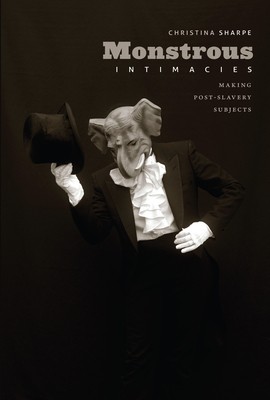
- We will send in 10–14 business days.
- Author: Christina Sharpe
- Publisher: Duke University Press
- ISBN-10: 0822346095
- ISBN-13: 9780822346098
- Format: 15.2 x 22.9 x 1.8 cm, minkšti viršeliai
- Language: English
- SAVE -10% with code: EXTRA
Reviews
Description
Arguing that the fundamental, familiar, sexual violence of slavery and racialized subjugation have continued to shape black and white subjectivities into the present, Christina Sharpe interprets African diasporic and Black Atlantic visual and literary texts that address those "monstrous intimacies" and their repetition as constitutive of post-slavery subjectivity. Her illuminating readings juxtapose Frederick Douglass's narrative of witnessing the brutal beating of his Aunt Hester with Essie Mae Washington-Williams's declaration of freedom in Dear Senator: A Memoir by the Daughter of Strom Thurmond, as well as the "generational genital fantasies" depicted in Gayl Jones's novel Corregidora with a firsthand account of such "monstrous intimacies" in the journals of an antebellum South Carolina senator, slaveholder, and vocal critic of miscegenation. Sharpe explores the South African-born writer Bessie Head's novel Maru-about race, power, and liberation in Botswana-in light of the history of the KhoiSan woman Saartje Baartman, who was displayed in Europe as the "Hottentot Venus" in the nineteenth century. Reading Isaac Julien's film The Attendant, Sharpe takes up issues of representation, slavery, and the sadomasochism of everyday black life. Her powerful meditation on intimacy, subjection, and subjectivity culminates in an analysis of Kara Walker's black silhouettes, and the critiques leveled against both the silhouettes and the artist.
EXTRA 10 % discount with code: EXTRA
The promotion ends in 22d.15:28:39
The discount code is valid when purchasing from 10 €. Discounts do not stack.
- Author: Christina Sharpe
- Publisher: Duke University Press
- ISBN-10: 0822346095
- ISBN-13: 9780822346098
- Format: 15.2 x 22.9 x 1.8 cm, minkšti viršeliai
- Language: English English
Arguing that the fundamental, familiar, sexual violence of slavery and racialized subjugation have continued to shape black and white subjectivities into the present, Christina Sharpe interprets African diasporic and Black Atlantic visual and literary texts that address those "monstrous intimacies" and their repetition as constitutive of post-slavery subjectivity. Her illuminating readings juxtapose Frederick Douglass's narrative of witnessing the brutal beating of his Aunt Hester with Essie Mae Washington-Williams's declaration of freedom in Dear Senator: A Memoir by the Daughter of Strom Thurmond, as well as the "generational genital fantasies" depicted in Gayl Jones's novel Corregidora with a firsthand account of such "monstrous intimacies" in the journals of an antebellum South Carolina senator, slaveholder, and vocal critic of miscegenation. Sharpe explores the South African-born writer Bessie Head's novel Maru-about race, power, and liberation in Botswana-in light of the history of the KhoiSan woman Saartje Baartman, who was displayed in Europe as the "Hottentot Venus" in the nineteenth century. Reading Isaac Julien's film The Attendant, Sharpe takes up issues of representation, slavery, and the sadomasochism of everyday black life. Her powerful meditation on intimacy, subjection, and subjectivity culminates in an analysis of Kara Walker's black silhouettes, and the critiques leveled against both the silhouettes and the artist.


Reviews